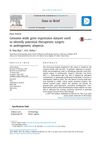 12 citations,
July 2012 in “Social Psychological and Personality Science”
12 citations,
July 2012 in “Social Psychological and Personality Science” Men with shaved heads are seen as more dominant but older and less attractive.
128 citations,
August 2020 in “Cell stem cell” Dermal fibroblasts have adjustable roles in wound healing, with specific cells promoting regeneration or scar formation.
 5 citations,
January 2022 in “Scientific reports”
5 citations,
January 2022 in “Scientific reports” The research identified two types of keratinocytes in chicken scales: one for hard scales and another for soft skin, with similarities to human skin differentiation.
 12 citations,
July 2021 in “Scientific Reports”
12 citations,
July 2021 in “Scientific Reports” Glutamic acid helps increase hair growth in mice.
 August 2024 in “Cell Death and Disease”
August 2024 in “Cell Death and Disease” Activating TLR9 helps heal wounds and regrow hair by using specific immune cells.
 24 citations,
January 2016 in “Lasers in Medical Science”
24 citations,
January 2016 in “Lasers in Medical Science” Erbium glass laser treatment may help with skin remodeling, reduce inflammation, and improve skin cell maturation.
 102 citations,
July 2007 in “Genes & Development”
102 citations,
July 2007 in “Genes & Development” A mother's PPARγ is crucial for preventing harmful milk that can cause inflammation and growth problems in babies.
June 2020 in “Journal of Investigative Dermatology” Atopic dermatitis shows a link between skin layers in inflammation, detectable with detailed gene analysis.
 4 citations,
May 2017 in “Data in Brief”
4 citations,
May 2017 in “Data in Brief” Five molecular elements identified as potential future targets for hair loss therapy.
3 citations,
August 2020 in “Animals” Researchers found a way to grow cashmere goat hair cells in a lab and discovered that certain conditions improve these cells' growth and characteristics.
7 citations,
August 2020 in “Genes” Different genes are active in dogs' hair growth and skin, similar to humans, which helps understand dog skin and hair diseases and can relate to human conditions.
 71 citations,
May 2007 in “The FASEB journal”
71 citations,
May 2007 in “The FASEB journal” Human hair follicles produce and respond to erythropoietin, helping protect against stress.
 47 citations,
July 2004 in “Journal of Dermatological Science”
47 citations,
July 2004 in “Journal of Dermatological Science” Hair loss in balding individuals is linked to changes in specific hair growth-related genes.
 31 citations,
January 2007 in “Journal of biological chemistry/The Journal of biological chemistry”
31 citations,
January 2007 in “Journal of biological chemistry/The Journal of biological chemistry” Stress activates a special function of the Vitamin D receptor with the help of c-Jun, which can also prevent cell death.
November 2022 in “Journal of Investigative Dermatology” Occipital hair follicles in male pattern baldness respond uniquely to testosterone, not androgen-insensitive.
14 citations,
June 2020 in “BMC genomics” The study identified key genes that regulate the growth cycle of cashmere in goats, which could help improve breeding strategies.
10 citations,
October 2021 in “Animal nutrition” Vitamin B6 helps increase hair growth and density in rabbits by affecting certain cell signaling pathways.
February 2024 in “Veterinary sciences” Canine pemphigus foliaceus involves significant immune activity and shares similarities with human pemphigus.
 62 citations,
January 2004 in “The journal of investigative dermatology/Journal of investigative dermatology”
62 citations,
January 2004 in “The journal of investigative dermatology/Journal of investigative dermatology” A second domain of high sulfur KAP genes on chromosome 21q23 is crucial for hair structure.
3 citations,
January 2023 in “Agronomy” KDML105 bran extract may help with hair growth and prevent hair loss.
 January 2023 in “Kafkas üniversitesi veteriner fakültesi dergisi/Kafkas üniversitesi veteriner fakültesi dergisi”
January 2023 in “Kafkas üniversitesi veteriner fakültesi dergisi/Kafkas üniversitesi veteriner fakültesi dergisi” Seasonal changes affect gene activity linked to hair growth in Angora goats.
8 citations,
March 2007 in “The journal of investigative dermatology/Journal of investigative dermatology” The near-naked hairless mutation causes hair loss but is not due to a mutation in the hairless gene itself.
January 2010 in “대한미용학회지” Polygoni multiflori Radix water extracts promote hair growth in mice.
January 2021 in “Research Square (Research Square)” STAT3 reduces FST gene activity and cell growth, affecting hair development and wool quality.
December 2023 in “Animals” The study mapped yak skin cells to understand hair growth better.
November 2024 in “Biochemical and Biophysical Research Communications” Abnormal gene expression related to keratin causes hair loss in certain mice.
 27 citations,
August 2005 in “The journal of investigative dermatology/Journal of investigative dermatology”
27 citations,
August 2005 in “The journal of investigative dermatology/Journal of investigative dermatology” Researchers found new genes involved in hair growth, which could help develop new hair treatments.
 April 2018 in “Journal of Investigative Dermatology”
April 2018 in “Journal of Investigative Dermatology” Lymphocytes, a type of immune cell, are crucial for wound healing as they help remodel damaged areas and reduce inflammation.
 35 citations,
January 2017 in “Journal of Dermatological Science”
35 citations,
January 2017 in “Journal of Dermatological Science” Stress can cause early aging in certain skin cells, leading to problems with hair growth.
 1 citations,
April 2009 in “The Proceedings of the International Plant Nutrition Colloquium XVI”
1 citations,
April 2009 in “The Proceedings of the International Plant Nutrition Colloquium XVI” Certain genes may promote longer root hairs in plants when phosphorus is low.
















